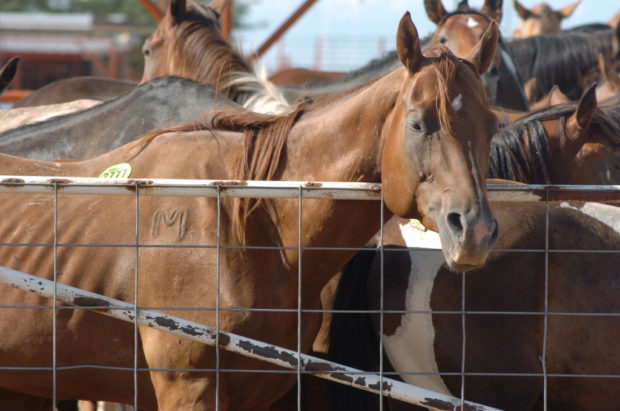
Members of the U.S. House signaled their interest in protecting American horses by holding hearings on two important bills this week: one to stop the dangerous practice of drugging racehorses to enhance their performance on the tracks or disguise pain, and another to keep American equines from facing a brutal death in a slaughterhouse so someone overseas can eat their meat.
The Horseracing Integrity Act, H.R.1754, heard yesterday by the House Committee on Energy and Commerce’s Subcommittee on Consumer Protection and Commerce, is becoming increasingly necessary at a time when we are being inundated with news about horses dying on racetracks. Since the beginning of last year, 42 horses have died at the Santa Anita racetrack in California alone and more than 20 have died just this month, highlighting the growing need for reform in an industry where animal athletes are medicated, often indiscriminately, creating a dangerous situation for both the horses and the jockeys who ride them.
Hall of Fame jockey Chris McCarron, a founding member of the HSUS National Horseracing Advisory Council, told committee members that on average, two jockeys die each year due to training or racing accidents and two more are left paralyzed. A vast majority of the tragedies, he said, happen when horses, who are racing with preexisting conditions masked by medications, break down during practice or races.
The Horseracing Integrity Act would end such medication abuse by replacing an outdated system that allows states to come up with their own rules on what drugs to allow in horseracing with no universal standard. The bill would ban race-day medication of horses and empower the U.S. Anti-Doping Agency—a non-profit organization that runs anti-doping programs for the Olympic and Pan American sports in the United States—to set up an authority that will ensure a nationally uniform set of rules on medication use in horseracing.
Committee members also heard yesterday from Joe De Francis, chair of the HSUS National Horseracing Advisory Council and former chief executive officer and controlling shareholder of the Maryland Jockey Club, who said the industry has tried and failed to fix problems in the past and needs help from Congress. Also among the speakers at yesterday’s hearing were the bill’s lead cosponsors, Reps. Paul Tonko, D-N.Y., and Andy Barr, R-Ky.
Reps. Barr and Tonko are also cosponsoring the Safeguard American Food Exports (SAFE) Act, H.R. 961, introduced by Reps. Jan Schakowsky, D-Ill., and Vern Buchanan, R-Fla., which had a hearing today in the House Energy and Commerce Subcommittee on Health. The HSUS and HSLF have long fought to end the slaughter of American horses, and our representatives attended the hearing this morning to support the legislation. This bill would permanently ban the reopening of domestic horse slaughter plants, as well as the transport of American horses abroad for slaughter in Canada and Mexico. A companion bill has been introduced in the Senate by Sens. Bob Menendez, D-N.J., and Lindsey Graham, R-S.C.
For years now, the HSUS and our coalition partners have prevailed in keeping horse slaughter plants from reopening in the United States by ensuring a prohibition was retained in Congress’s annual spending bill. But that does not stop “kill buyers” from acquiring American horses at auctions and shipping them abroad for slaughter. Each year tens of thousands of American horses are shipped to Canada and Mexico where they are butchered for their meat.
The animals, including retired racehorses, show ponies and family pets, are loaded into cramped livestock trailers where they spend many hours without food and water. The frightened animals often get into fights and are injured or even killed during transport. At the end of their journey, these unlucky animals face a gruesome death.
American horses are not raised for human consumption. Many are treated or injected with medications and chemical substances that are dangerous to humans and prohibited for use in animals raised for human consumption. This makes ending the slaughter of horses not just an important animal protection issue but also a key human health concern. In fact, the European Union in 2014 suspended all imports of horsemeat from Mexico precisely over such concerns. More than 80 percent of the horses killed in Mexican slaughterhouses originate from the United States.
The SAFE Act has been endorsed by a wide spectrum of organizations, including the Humane Society Veterinary Medical Association (HSVMA), the ASPCA, Animal Welfare Institute, Return to Freedom, The Jockey Club and the National Thoroughbred Racing Association. We are happy to see Congress is now moving on this important bill, and on the Horseracing Integrity Act, and we urge members to act swiftly to pass these two bills into law this year. American equines are beloved companions who deserve our admiration and our gratitude for their service to our nation. It is not much to ask that they be protected from extreme suffering that could include being pumped with dangerous drugs or being shunted to slaughter in a foreign land, or both.
Ask your federal legislators to cosponsor the SAFE Act and the Horseracing Integrity Act.
The post U.S. House members hear compelling testimony on bills to protect horses from drugging, slaughter appeared first on A Humane World.
Enviroshop is maintained by dedicated NetSys Interactive Inc. owners & employees who generously contribute their time to maintenance & editing, web design, custom programming, & website hosting for Enviroshop.
